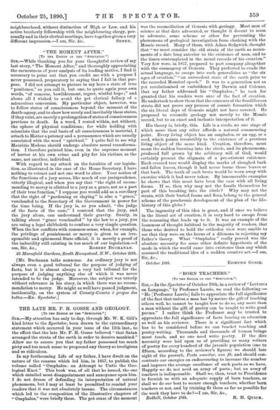"THE MOMENT AFTER."
go THE EDITOR OF THE " SPECTAT08."1
Ste,—While thanking you for your thoughtful review of my last story, " The Moment Alter," and thoroughly appreciating the earnestness of your analysis of its leading motive, I find it necessary to point out that you credit me with a purpose I never possessed, preparatory to saying that I fail in that pur- pose. I did not attempt to picture in my hero a state of true "penitence," as you call it, but one, to quote again your own words, "of remorse, bewilderment, regret, wistful hope ;" and above all I wished to avoid the pet clerical fallacy of a miraculous conversion. My particular object, however, was to follow states of consciousness beyond the moment of the death-agony, and to show how surely and inevitably these states, if they exist, are merely a prolongationof states of consciousness previous to death. In a word, I rested within, not without, the sphere of physical conditions ; for while holding with scientists that the real basis of all consciousness is material, I attach to Matter a potency and a permanence which are usually associated with the word " spiritual." I quite fail to see why Maurizio Modena should undergo absolute moral transforma- tion. I therefore painted him, even in the supreme moment of horror at his own crime and pity for his victims, as the same, not another, individual.
With regard to my attack on the fatuities of our legisla- tion, as illustrated in the case of the Home Secretary, I have nothing to retract and not one word to alter. Your notion of the functions of a jury seems, like much of our jurisprudence, utterly illogical, and when you say that "the right of recom- mending to mercy is allotted to a jury as a grace, not as a part of their true function," I suppose you would add as a corollary that the right of "pardoning or slaying" is also a " grace," vouchsafed to the Secretary of the Government in power for the time being. If the jury is, as you admit, " the judge of the facts of the case," I contend that the jury, and the jury alone, can understand their gravity. Surely, in talking about " grace vouchsafed " by the law to a jury, you are using a legal shibboleth to confuse a very simple question. When the law conflicts with common-sense, when, for example, the privilege of punishment or mercy is given to an irre- sponsible and ephemeral State official, it is merely a proof of the imbecility still existing in too much of our legislation.—I 25 Maresfield Gardens, South Hampstead, N.W., October 20th.
[Mr. Buchanan talks nonsense. An ordinary jury is not always even a good tribunal for the purpose of judging of facts, but it is almost always a very bad tribunal for the purpose of judging anything else of which it was never intended to be the judge. Moreover, the subject was utterly without relevance in his story, in which there was no recom- mendation to mercy. He might as well have passed judgment, incidentally, on the system of County-Courts a propos des bottes.—ED. Spectator.]






































 Previous page
Previous page